
Fearing more cases to come, World Health Organization (WHO) Tuesday said that a 28-year-old man had tested positive for Middle East Respiratory Syndrome Coronavirus (MERS-Cov) in the capital of the United Arab Emirates (UAE).
The case was reported on July 10 by Abu Dhabi’s city of Al Ain which borders with Oman.
The Geneva-based organisation said that it was more interested in the latest case as it "had no history of direct or indirect contact with dromedaries, goats, or sheep."
"The patient was admitted to the hospital on June 8. A nasopharyngeal swab was collected on June 21 and tested positive for Mers-CoV by polymerase chain reaction (PCR) on June 23," the WHO said in a statement.
The multilateral health organisation also stated that the man was a non-resident of the UAE.
The global body was also told about 108 people with whom the affected person came in contact with. "After examining all of them for 14 days, no secondary cases were reported," said WHO.
MERS-CoV is a kind of virus that jumps from animals to humans, also called a zoonotic virus.
Research suggested that people contract the virus by direct or indirect contact with infected dromedary camels, but how the virus exactly transmits is unclear.
"WHO expects that additional cases of MERS infection will be reported from the Middle East and/or other countries where MERS is circulating in dromedaries," WHO said.
“WHO re-emphasises the importance of strong surveillance by all Member States for acute respiratory infections, including MERS, and to carefully review any unusual patterns," it stated.
It said that cases will continue to spread to other countries by individuals exposed to the virus through contact with dromedaries or their products (for example, consumption of camel’s raw milk), or in a healthcare setting.
“Given that this latest case presents with severe disease but has no comorbidities and no exposure history to camels, camel raw products or MERS-CoV human case, it will be important to sequence the virus and conduct genomic analysis to screen for any unusual patterns," the health body said.
"The process for genomic analysis has begun. This will identify any genetic evolution of the virus and support WHO’s global risk assessment efforts."
It is the first MERS case reported in UAE since 2013. 94 new infections were confirmed, including this one, with the death toll standing at 12.
The global number of reported cases to WHO is 2,605, including 936 deaths linked with MERS.
MERS can cause fever, coughing, and shortness of breath, and in some cases can lead to pneumonia.













0 Comments